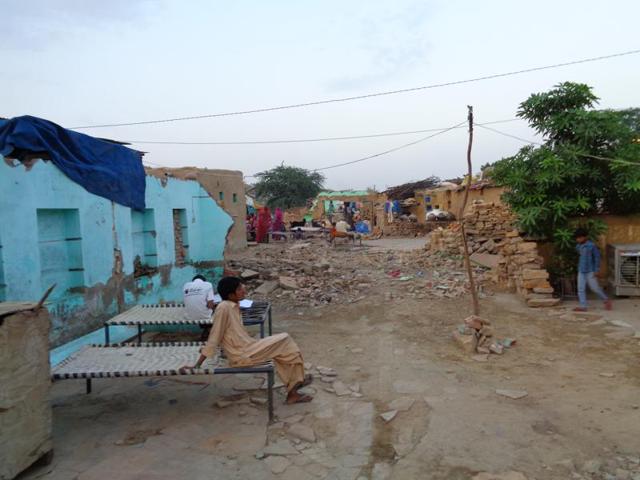‘Pakistani’ Hindus still wait to be accepted in India
According to government records over 10,000 Pakistani Hindu refugees are living at Bhil Basti, a massive ghetto at the heart of Jaisalmer in Rajasthan.
For 26-year-old Omprakash, his nationality has always been ambiguous.

According to government records, he is one of the 10,000 Pakistani Hindu refugees living at Bhil Basti, a massive ghetto at the heart of Jaisalmer in Rajasthan. But there is one catch: He has never been out of India.
“My parents migrated from Pakistan in the early 1980s and I was born here in India. But in spite of the fact that my family moved to India long back, we still live in refugee-like conditions, without any water or steady income to support our families,” Omprakash says.
“Most of the people here are engaged in menial labour and go to work either in stone quarries or on the land of other people as daily-wage labourers. Many politicians and activists visit us from time to time and have given assurances but their promises didn’t amount to anything,” he adds.
Time has remained stagnant in Bhil Basti that is home to an estimated 1,000 families who have migrated from Pakistan in the last three decades. The absence of sewage facilities and water connection has resulted in highly unhygienic conditions in the ghetto.
Children can be seen playing alongside pigs that have found the place to be an appropriate breeding ground with cringe-worthy sanitation facilities in the ghetto.
The 8-10 thousand people living in Bhil Basti source their water from a leaking public health engineering department (PHED) pipeline near the ghetto as there’s no water connection in the area.
“Even the PHED water supply is not regular and at times we have to make do without any water for bathing and washing. There is no sewage facility in the Basti and the toilets are actually pits dug inside our homes,” Nathuram, who migrated from Pakistan in 1987 and is now a BJP councillor of the area, says.
In spite of being a member of the ruling Bharatiya Janata Party, Nathuram says that his requests for better facilities in the settlement have fallen on deaf ears.
“In the manifesto of the BJP before the elections, rehabilitation of Pakistani refugees was a major point but nothing has happened so far. Every month around 10 families are coming here from Pakistan and most of them have to live under the open sky,” Nathuram says.
Kafirs vs caste politics
As one strolls across the shanty with houses many of which are tents or just cots under the open sky, furtive and suspicious glances greets you. A long history of religious persecution and their experiences from across the border have made Bhil Basti residents wary of strangers.
“I came to India from Pakistan two years ago after one of my relatives, a highly educated and respected man, was killed by religious fanatics. I had an established source of income there but I couldn’t live in fear anymore,” Arvind Singh (name changed) says.
Singh fears that giving his real name could result in repercussions for his family members who still live in Pakistan.
Residents of Bhil Basti say that the inflow of Pakistani Hindus has gone up because of the increasing extremism and persecution of religious minorities in Pakistan. Most of the people living in the ghetto are from the Punjab province of Pakistan and come from cities such as Rahim Yar Khan.
“At the time of general Pervez Musharraf things were comparatively better for us but now, under the Nawaz Sharif government, the people from the Jamaat and radical clerics regularly persecute Hindus. Everyone in a village knows that when a Hindu family is going to migrate. People take the opportunity to buy their lands for a pittance and they have no choice but to oblige,” Puttaram, another resident who migrated in recent years, says.
He adds that at times it gets even worse as right after the families sell their lands, they are robbed of their money by members of extremist organisations, leaving them helpless.
India too has its fair share of problems for Pakistani Hindus and caste is one of them.
“In Pakistan, we were all Hindus and were called kafirs regardless of our caste or creed. But after coming to India, we were made to realise that here also they have their own ways of classifying people. Now we know, that we are not only Hindus but further divided into general, SC, ST and OBC categories,” Arvind Singh says wryly.
‘Generations pushed to poverty’
Hindu Singh Sodha, an activist and founder of Seemant Lok Sangathan, says that Pakistani Hindu refugees in India face government neglect and bureaucratic hazards, resulting in poverty and destitution for such families.
“There are currently 21,000 such people in Rajasthan who have migrated from Pakistan in recent years and the number is increasing every year. A total of 1,35,000 Pakistani Hindus have come to India from 1965 and now their population have increased to around 5 lakh,” Sodha says.
“Most of these people still live in inhuman conditions as very few thoughts have been spared by the government for their rehabilitation.”
He adds clauses that say refugees have to produce proof of the fact that their parents were born in undivided India must be removed in order to make the process of rehabilitation easier.
“We have proposed several changes in the Citizenship (Amendment) Bill 2016 which if incorporated by the government could substantially improve the situation of persecuted religious minorities from neighbouring countries who are coming to India,” he says.
A joint parliamentary committee is currently examining the bill.
“If only the various governments had paid any heed to the difficulties faced by these people then three generations of Pakistani Hindus wouldn’t have been pushed to poverty and be living in a pitiable condition,” Sodha says.





